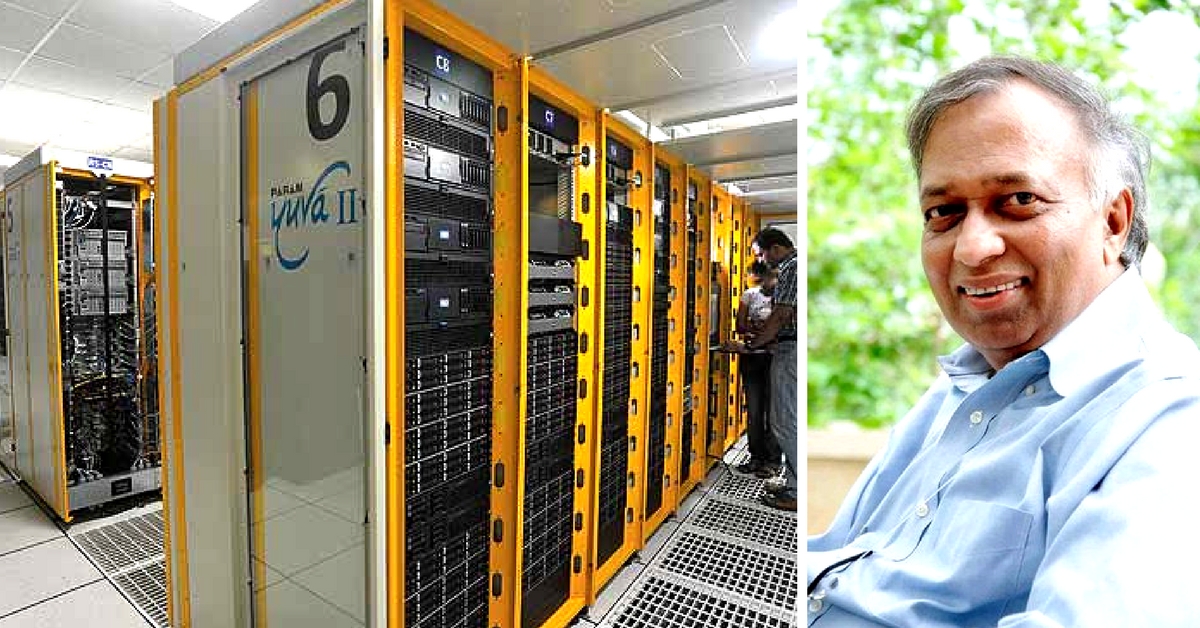Developing A Supercomputer In Space: China's Technological Advancements

Table of Contents
The Challenges of Developing a Space-Based Supercomputer
Developing a supercomputer capable of functioning in the harsh environment of space presents a formidable set of challenges. The extreme conditions, power limitations, and communication difficulties require innovative solutions far beyond those used in terrestrial supercomputing.
Extreme Environmental Conditions
The unforgiving environment of space poses significant threats to electronic components.
- Radiation: High-energy particles and cosmic rays can cause Single Event Upsets (SEUs) and damage sensitive circuitry, leading to system errors and malfunctions. Radiation hardening of components is critical.
- Extreme Temperature Fluctuations: Temperatures in space vary drastically between direct sunlight and shadow, demanding robust thermal management systems.
- Vacuum of Space: The lack of atmospheric pressure requires components to be designed to withstand the extreme vacuum.
- Microgravity Effects: The absence of gravity can affect the performance of mechanical components and fluid dynamics within cooling systems.
These factors necessitate specialized components and robust system designs. Radiation hardening techniques, such as the use of radiation-tolerant materials and error-correcting codes, are crucial for mitigating the effects of radiation. Sophisticated thermal management systems, including heat pipes and advanced insulation, are essential to control temperature fluctuations and prevent overheating. Careful consideration of material selection and component design is critical to ensure stability and reliability in the vacuum of space.
Power Constraints
Power generation in space is limited primarily to solar energy, and energy storage is essential for periods of shadow.
- Limited Solar Power Availability: Solar panels have limited efficiency and are subject to degradation over time.
- Efficient Power Consumption: The supercomputer must be exceptionally energy-efficient to maximize its operational time.
- Energy Storage Solutions: High-density, long-life batteries are required to maintain operation during periods of darkness or solar eclipses.
Developing a highly efficient power system is paramount. This includes optimizing the design of the supercomputer to minimize power consumption, utilizing advanced solar cells with high conversion efficiency, and developing advanced battery technologies with high energy density and long cycle life.
Data Transmission and Communication
Transmitting vast amounts of data from a space-based supercomputer back to Earth presents significant challenges.
- Latency Issues: The immense distances involved lead to significant signal delays, affecting real-time applications.
- Bandwidth Limitations: Current communication systems may struggle to handle the massive data volumes generated by a space-based supercomputer.
- Secure Data Transmission Protocols: Robust encryption and security measures are essential to protect sensitive data during transmission.
Overcoming these hurdles requires the development of high-bandwidth, low-latency communication systems, potentially utilizing advanced laser communication technologies. Furthermore, robust data compression techniques and efficient error correction protocols are necessary to ensure reliable and secure data transfer.
Key Technological Advancements Driving the Project
China's ambition to develop a supercomputer in space relies heavily on significant advancements in several key technologies.
Advanced Materials and Component Miniaturization
Miniaturization is crucial for reducing weight, power consumption, and susceptibility to radiation damage.
- Use of Advanced Semiconductors: The adoption of advanced semiconductor materials and fabrication techniques is vital for improving performance and radiation tolerance.
- Miniaturized Components: Smaller components reduce the overall size and weight of the supercomputer, simplifying integration and reducing thermal management challenges.
- Improved Heat Dissipation Materials: Advanced materials with enhanced thermal conductivity are essential for efficiently managing heat generated by the powerful processors.
China's investments in materials science are yielding breakthroughs in the development of smaller, faster, and more radiation-hardened components. Specific examples, while not publicly available in detail, likely include research into new semiconductor materials and advanced packaging technologies.
Novel Cooling Technologies
Effective cooling is critical in the absence of convection in the vacuum of space.
- Two-Phase Cooling Systems: These systems utilize the phase change of a working fluid (liquid to vapor) to efficiently remove heat.
- Loop Heat Pipes: These capillary-driven heat transfer devices provide a passive and reliable method for heat dissipation.
- Advanced Thermal Management Strategies: Innovative thermal management strategies are crucial to maintain the operational temperature of the components.
The development of advanced cooling technologies, such as loop heat pipes and two-phase cooling systems, is vital for preventing overheating and ensuring the reliable operation of the space-based supercomputer.
Artificial Intelligence and Autonomous Operation
AI plays a crucial role in enhancing the reliability and efficiency of the system.
- AI-powered Fault Tolerance: AI algorithms can help detect and correct errors, enhancing system resilience.
- Self-Diagnosis: AI-driven self-diagnosis capabilities allow for automated troubleshooting and repair.
- Autonomous Operation Capabilities: Autonomous operation reduces the reliance on ground control and enhances operational flexibility.
Integrating AI into the supercomputer's design is critical for enabling autonomous operation, fault tolerance, and self-diagnosis, minimizing the need for constant human intervention.
Potential Applications and Implications of a Space-Based Supercomputer
A functional space-based supercomputer would unlock unprecedented capabilities across various fields.
Scientific Research and Discovery
The enhanced computational power could revolutionize scientific research.
- Astronomy: Simulating the evolution of galaxies and stars, analyzing astronomical data.
- Astrophysics: Modeling black holes, investigating dark matter and dark energy.
- Earth Observation: Analyzing climate data, improving weather forecasting, monitoring environmental changes.
- Climate Modeling: Developing more accurate climate models to better understand and predict climate change.
- Space Weather Prediction: Improving the prediction and mitigation of space weather events that can disrupt satellites and communication systems.
Space Exploration and Navigation
A space-based supercomputer could significantly enhance space exploration missions.
- Advanced Satellite Control: Enabling more precise and efficient control of satellites and constellations.
- Autonomous Navigation Systems: Developing advanced autonomous navigation systems for spacecraft.
- Real-Time Data Processing for Space Missions: Providing real-time data analysis and decision support for deep space missions.
National Security and Defense
While details remain classified, the potential applications are significant.
- Satellite Surveillance: Improving the capabilities of space-based surveillance systems.
- Early Warning Systems: Contributing to the development of more effective early warning systems for various threats.
- Improved Communication Networks: Facilitating secure and reliable communication networks in space.
Conclusion
Developing a supercomputer in space is a monumental technological challenge with potentially transformative implications. China's progress in materials science, AI, and thermal management is paving the way for this ambitious goal. The successful deployment of such a system would revolutionize scientific discovery, space exploration, and national security. Stay informed about the future developments in this exciting and rapidly advancing field of space-based supercomputing. Further research into China’s advancements in developing a space-based supercomputer will undoubtedly reveal more groundbreaking achievements in the years to come.

Featured Posts
-
 Future Of Microsoft Activision Deal Uncertain After Ftc Appeal
May 21, 2025
Future Of Microsoft Activision Deal Uncertain After Ftc Appeal
May 21, 2025 -
 Peppa Pigs New Baby Sister A Girl Arrives
May 21, 2025
Peppa Pigs New Baby Sister A Girl Arrives
May 21, 2025 -
 Abn Amro Ziet Flinke Groei In Occasionverkopen Analyse Van De Markt
May 21, 2025
Abn Amro Ziet Flinke Groei In Occasionverkopen Analyse Van De Markt
May 21, 2025 -
 Is Your Love Monster Sabotaging Your Happiness Practical Solutions
May 21, 2025
Is Your Love Monster Sabotaging Your Happiness Practical Solutions
May 21, 2025 -
 Why Do Gen Z Love Little Britain Despite Its Cancellation
May 21, 2025
Why Do Gen Z Love Little Britain Despite Its Cancellation
May 21, 2025
Latest Posts
-
 Cultivating Resilience A Guide To Mental Strength
May 21, 2025
Cultivating Resilience A Guide To Mental Strength
May 21, 2025 -
 Staying Safe During Fast Moving Storms With High Winds
May 21, 2025
Staying Safe During Fast Moving Storms With High Winds
May 21, 2025 -
 Bayern Munichs Bundesliga Triumph Delayed Leverkusen Victory And Kanes Absence
May 21, 2025
Bayern Munichs Bundesliga Triumph Delayed Leverkusen Victory And Kanes Absence
May 21, 2025 -
 Boosting Mental Resilience Overcoming Challenges And Thriving
May 21, 2025
Boosting Mental Resilience Overcoming Challenges And Thriving
May 21, 2025 -
 Damaging Winds Essential Safety Tips For Fast Moving Storms
May 21, 2025
Damaging Winds Essential Safety Tips For Fast Moving Storms
May 21, 2025
